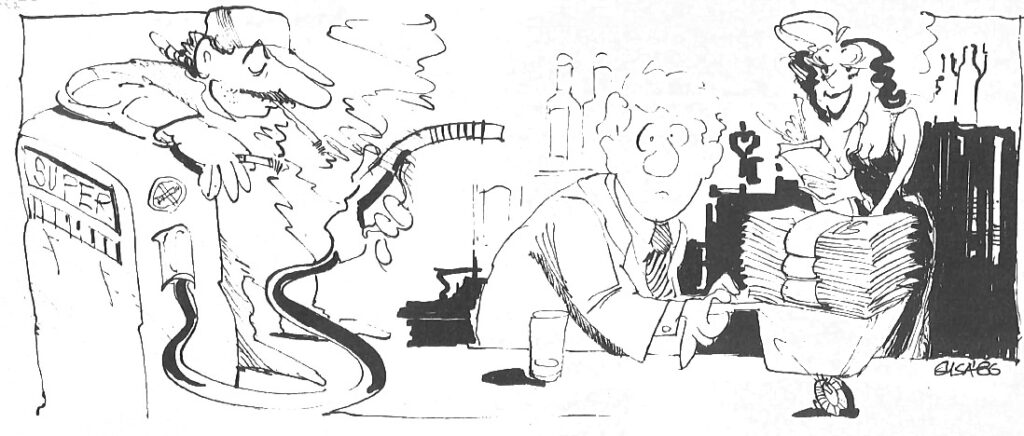
In one department of the NTO, a placid clerk, chosen for the extraordinary thickness and total impermeability of his skin, and whose job it was to read and answer the hundreds of letters the NTO receives from tourists each month, sipped the last vestige of humidity from the dregs of his coffee cup, picked up a sheaf of letters and went upstairs to the office of his department head.
The department head looked up in surprise. The clerk, Hondropetsaras, was the one person who could do his job competently and efficiently, and who never bothered him with questions on how to deal with even the most outrageous or unspeakable complaints that flowed into his IN basket. Indeed, he particularly remembered a letter from a Palestinian group complaining that security at Athens airport had become so tight that its members had changed their minds about spending their vacations in Greece and had decided to stay home.

Hondropetsaras had written a very nice reply saying the NTO regretted their decision, and explained that conditions at Athens airport had to be adapted to the requirements of many different factors. However, he assured the Palestinians that their requirements would also be taken into account, and that conditions might possibly be adapted to suit them as well and enable them to come later this year, or next year without fail. After all, it was not for nothing that Greece was a bridge to the Arab world. The department head still remembered that letter with awe and admiration.
“What is it?” he asked Hondropetsaras.
“More complaints about hotel breakfasts? We must do something about those Elite rusks, y’know.” Hondropetsaras shook his head.
“No, just a few letters I think you should see and then perhaps pass on to our Promotion Department.”
The department head was intrigued. He picked up the first letter, which was from a Mr W.D. Wills in Manchester, and read: “As you will guess from my name I come from a well-known cigarette-manufacturing family and I have smoked two packs a day for as ·long as I can remember. Recently, in England, life has become impossible for smokers. We cannot smoke in the underground trains, in most public places and even in many people’s homes. We are treated something like pariahs and are building up guilt complexes of appalling magnitude. Imagine my joy, during my recent holiday in ‘Greece, to discover that everybody smokes in your lovely country and that it is the non-smoker who is in the minority. I found I could smoke anywhere and everywhere, and it filled my heart with gladness to see even garage attendants filling the tanks of cars wit a lighted cigarette dangling from their lips. ln restaurants I could light up after every course without attracting indignant glares from neigh boring tables and it was a pleasure to see not only the public ignoring NO SMOKING signs in banks and post offices, but the employees as well. My guilt complex had almost disappeared when, towards the end of my stay, I took a taxi and saw a sign inside saying: PLEASE DO NOT SMOKE. ‘Oh, no,’ I thought, it’s not starting here too, is it?’ But then I saw the cabbie himself lighting up and when I asked him why the sign, he said: ‘Oh, that’s my relief driver. The cab runs on butane gas and he’s afraid that if there’s a leak and someone’s inside with a lighted cigarette the whole thing could go up with a bang. But I don’t care.’ And so, I left Greece a happy man and I shall recommend it to all my two- and three-pack-a-day friends.”
“Very nice,” the department head said, “makes your heart swell with pride to read letters like that, doesn’t it?”
Hondropetsaras was a little dubious about that, but he made a noncommittal noise and the department head went on to the next letter. It was’ from a Dutch garbage collector who had just spent two weeks in Greece.
“I must explain to you first,” he wrote, “that I work in a very small country where everything has to be kept neat and tidy, otherwise there would be chaos. The rules governing garbage collecting and disposal are therefore necessarily very strict and, in the twenty-five years I have been employed as a garbage collector, I have had to submit to this rigid discipline every day of my working life. Imagine my surprise and my joy to come to your beautiful country and to see the casual way in which garbage is scattered all over the place, by the roadside, down ravines, on the beaches, in open dumps and standing out in every stark detail under the glare of your strong sun, and sometimes attracting flocks of crows or seagulls to complete the picturesqueness of the scene. After dealing all my life with sealed containers and thoroughly antiseptic and invisible disposal procedures, it was a pleasure for me to sit for hours and contemplate the uninhibited display of waste products that have been my bread and butter for a quarter of a century, but which I had never seen so beautifully exposed in all their glory. Thank you. I had a lovely time.”
The department head made a face. “Must be a nut case,” he muttered. “Let’s see the next one.”
The next letter was from Fred Bumblehammer Jr. of Phoenix, Arizona, who wrote: “I want to thank you for making it possible for me to appear in the Guinness Book of Records. I have just received confirmation from the editors that I shall be entered in the 1987 edition as the man who paid ‘the highest price in the world for one ouzo and two glasses of champagne while sitting for five minutes at the bar of a basement dive in Syntagma. I had the ouzo and the two floozies who came up to me on both sides had the champagne and the bill came to the equivalent of $2,367.70. I paid, had the bill certified by a notary public and now my name will live forever in the Guinness Book of Records for 1987. Cheap at the price. Thank you again. I had a lovely time.”
The department head made no comment on that one. He went on to the next letter, which was from a cab driver in Naples. “I have always prided myself on being the cha~pion ripper-off of tourists in the Naples area by charging three or even four times the normal fare and getting away with it. But on a recent vacation in Greece the cab driver who took me from Athens airport to my hotel really took me for a ride. He charged six times the normal fare without batting an eyelid. I was so impressed I arranged to spend the last three days of my vacation riding beside him in his cab to study his technique. Now I am looking forward .to doubling my earnings here in Naples, and I just wanted to express my appreciation to you. I had a lovely time.”
“No signature on this one,” the department head grunted.
“Naturally,” Hondropetsaras said.
“Look, I haven’t time to go through the rest of these. Why do you think the Promotion Department could use these letters?”
Hondropetsaras shrugged. “It’s up to them, really, but I imagine it shouldn’t be too hard for them to get their hands on mailing lists of tobacconists in the U.K., garbage collectors in the more advanced EEC countries and the Camora in Naples. They can send them photo stats of the appropriate letters with a covering note and flight schedules from their respective countries to Greece. With the Americans staying away in droves we can’t be too choosy, can we?”







